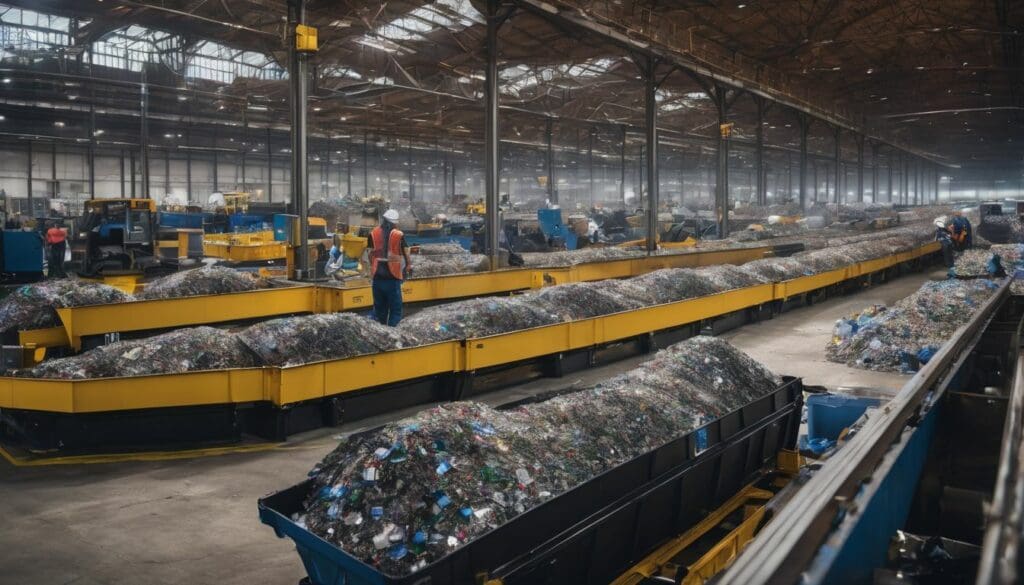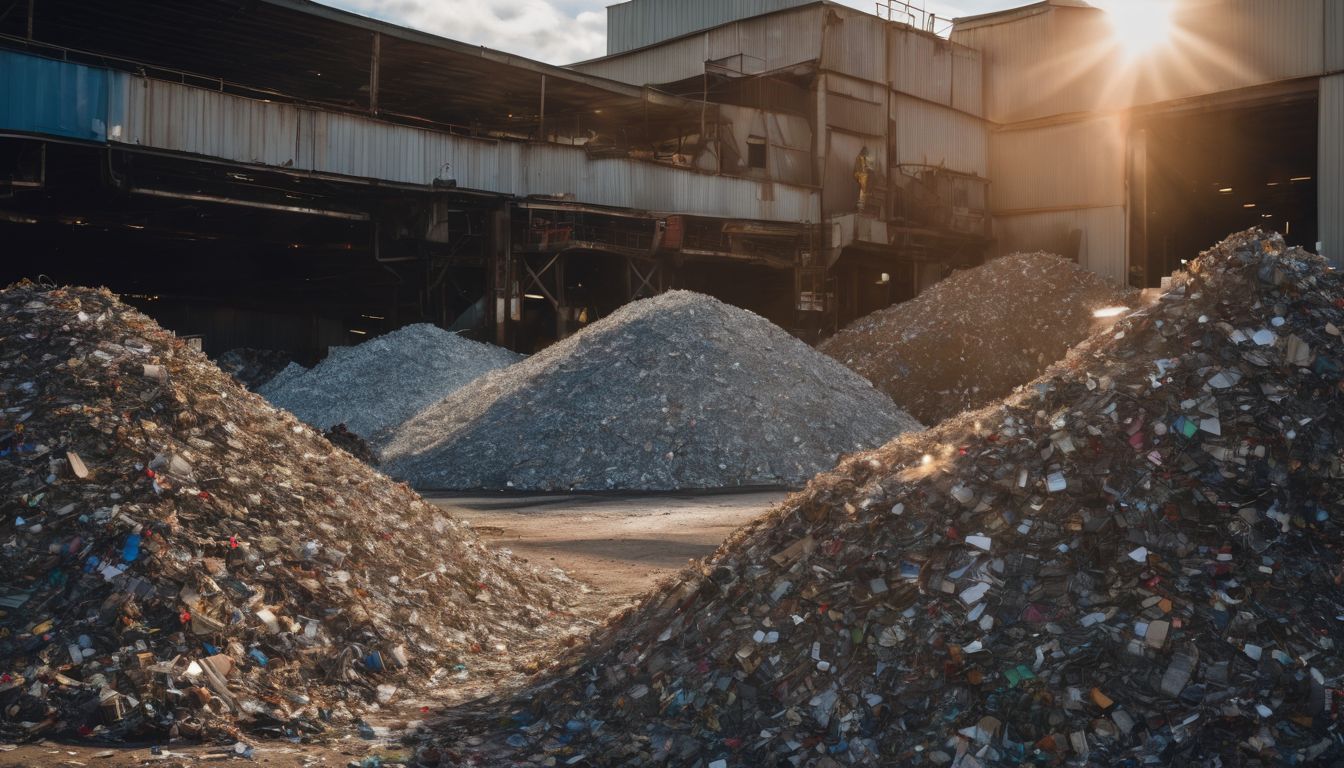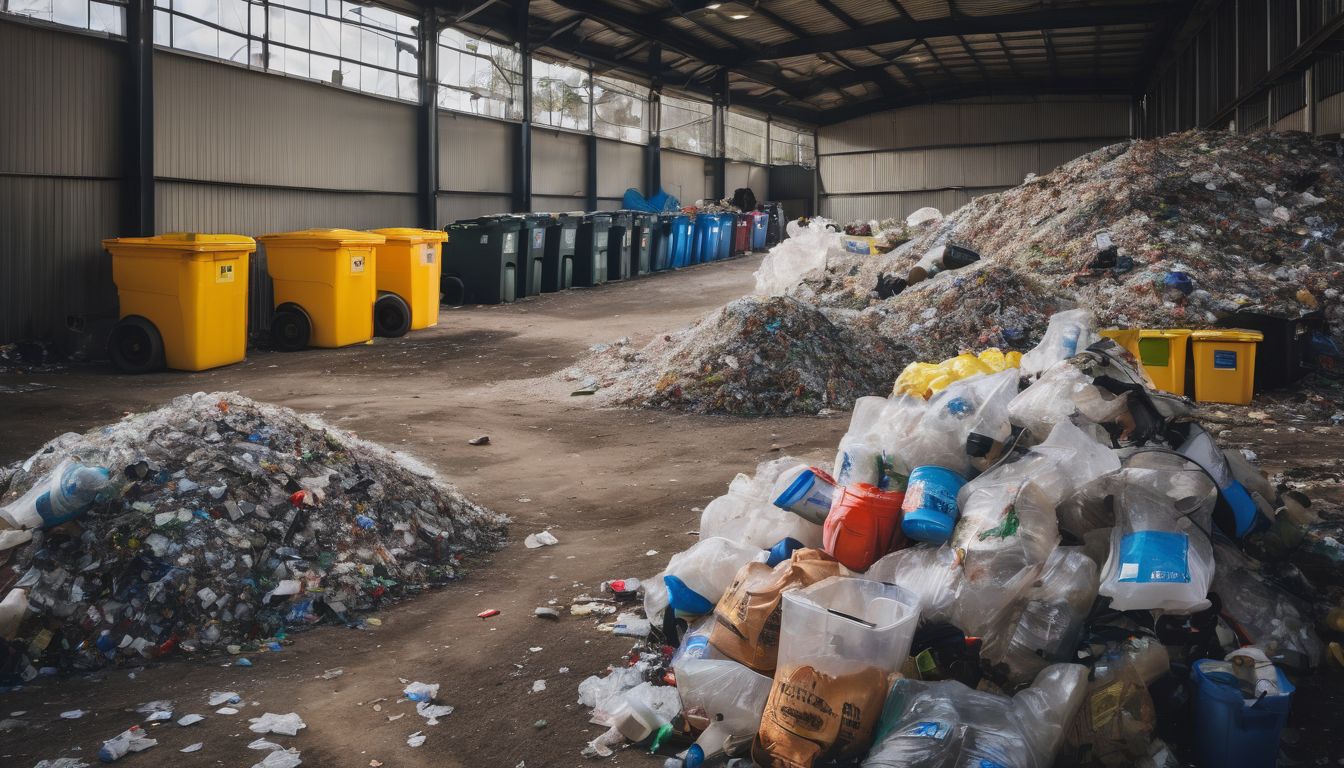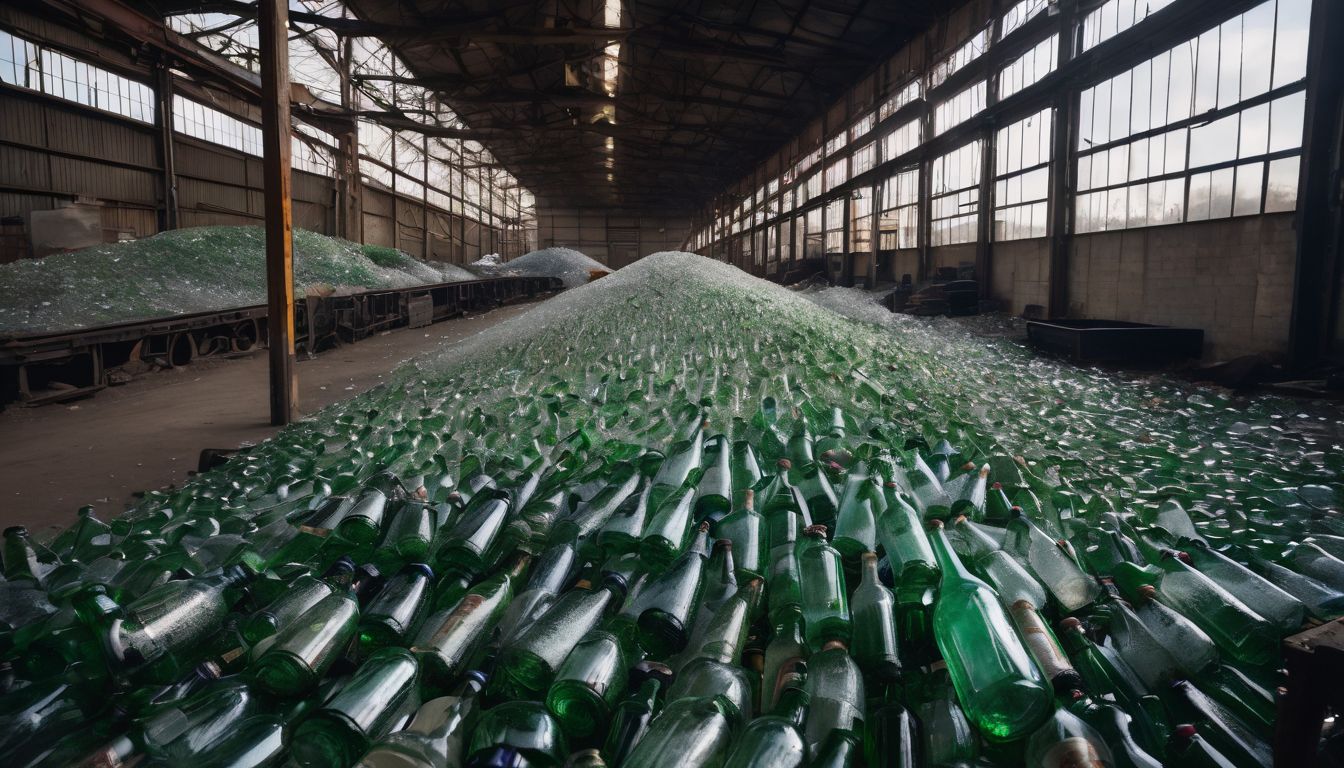Recycling can be a complex task, but it’s crucial for our planet’s health. Did you know that artificial intelligence is reshaping how we recycle waste? Our blog will show you the smart ways AI boosts recycling efforts, making them more effective and less costly.
Discover the future of green living inside!
Key Takeaways
- AI enhances recycling efficiency by optimising routes for collection trucks, reducing fuel use and emissions. Robotic sorting also works non-stop, increasing productivity and saving materials from landfill.
- Through machine learning, AI identifies different types of recyclables with precision, improving the accuracy of sorting and the quality of recycled materials.
- Amazon’s purchase of iRobot demonstrates significant investment in AI for waste management, highlighting the technology’s growing importance in advancing recycling methods.
- AI reduces costs involved in recycling by cutting down on manual labour and streamlining operations. This leads to better profitability for businesses in the sector.
- The integration of AI in waste management systems is key to achieving a circular economy where materials are reused instead of discarded, minimising environmental impact.
Importance of AI in Plastic Recycling
AI plays a crucial role in plastic recycling by improving efficiency, identifying and sorting recycled materials, and streamlining waste collection processes. Its use in these areas has the potential to significantly enhance the overall effectiveness of recycling efforts.
Improving efficiency
Artificial Intelligence revolutionises how we manage waste by enabling the recycling industry to operate more swiftly and smartly. Advanced AI systems can dissect mountains of data, optimising routing for collection trucks which reduces fuel consumption and emissions.
These self-learning algorithms are also quick to adapt, meaning they constantly evolve to find the fastest way to transport recyclables from bins to facilities.
Robots don’t tire or need breaks, so they’re perfect for sorting recycled materials around the clock. They work tirelessly, picking out recyclable items with precision at a speed no human team could match.
This cuts down on labour costs and heightens productivity while ensuring that more materials are saved from landfill sites every day. Such relentless efficiency helps drive environmental sustainability forward—an outcome anyone passionate about conservation can celebrate.
Identifying and sorting recycled material
AI plays a crucial role in identifying and sorting recycled material. Through advanced algorithms and machine learning, AI can accurately differentiate between various types of recyclable materials such as plastic, glass, and metal.
Additionally, robotics equipped with AI technology can efficiently sort through large volumes of waste, separating items for recycling with precision. This automated approach not only increases the speed of sorting but also improves the overall accuracy, ensuring that valuable resources are effectively salvaged.
Moreover, AI-guided waste management systems enable real-time tracking and monitoring of recycled material, optimising the entire process. These advancements contribute to sustainable development by reducing waste and promoting the reuse of valuable resources while minimising environmental impact.
Streamlining waste collection
To streamline waste collection, AI plays a crucial role in automating the sorting and separation of recyclable materials. Using machine learning algorithms, robotic arms can accurately identify, sort, and separate different types of recyclables from the waste stream.
This reduces reliance on manual labour and ensures that valuable materials are efficiently recovered for recycling.
Additionally, AI-guided waste management systems can optimise collection routes and schedules based on real-time data, minimising fuel consumption and reducing environmental impact.
Examples of AI in Recycling
EverestLabs utilises robotic arms and AI to automate the sorting process, while Amazon’s acquisition of iRobot shows a significant investment in AI-powered waste management systems.
EverestLabs using robotic arms and AI
EverestLabs employs robotic arms and AI algorithms to enhance the recycling process by automating waste sorting. The technology efficiently identifies and separates recyclable materials, boosting overall recycling rates.
Through the use of machine learning, EverestLabs’ robotic arms can quickly and accurately categorise different types of waste, streamlining the recycling workflow.
Moreover, this AI-guided waste management system not only reduces human error but also increases the value of recycled materials. By facilitating automated sorting, EverestLabs contributes to a more sustainable approach to recycling while mitigating environmental impact caused by improper disposal practices.
Amazon’s acquisition of iRobot
Transitioning from the use of robotic arms and AI in recycling, Amazon’s acquisition of iRobot has further emphasised the integration of smart technology in waste management. With this strategic move, Amazon aims to harness iRobot’s expertise in robotics and artificial intelligence to enhance its capabilities in automated recycling and waste reduction.
By leveraging iRobot’s advanced technologies, Amazon seeks to continue revolutionising the recycling industry with innovative solutions that contribute towards a sustainable environment.
Amazon’s acquisition presents an exciting prospect for the future of recycling as it signifies a commitment to driving efficiency and sustainability through machine learning and automation.
The partnership between Amazon and iRobot holds promise for developing renewable products, promoting recycling efficiency, and advancing waste reduction efforts through the power of AI-guided waste sorting systems.
AI-powered waste management system
Transitioning from Amazon’s acquisition of iRobot, AI-powered waste management systems are revolutionising recycling processes. By integrating artificial intelligence and robotics, these systems can automatically sort and separate recyclable materials, improving efficiency and reducing contamination.
This technology enables the identification of different types of waste, ensuring that materials are properly sorted for recycling processes.
Furthermore, AI-guided waste management enhances the overall sustainability of recycling by streamlining waste collection and reducing operating costs. With machine learning capabilities, these systems continuously improve their accuracy in sorting materials over time.
Benefits of AI in Recycling
AI in recycling offers improved accuracy, reduced operating costs, and increased value of recycled materials. Learn more about the exciting potential of AI in shaping the future of recycling.
Improved accuracy
Artificial intelligence enhances recycling accuracy, ensuring that materials are properly sorted and processed. By using advanced technology, AI can identify and categorise different types of recyclable objects with precision, reducing errors in the sorting process.
This improvement in accuracy leads to a higher quality of recycled materials, contributing to the overall efficiency and effectiveness of recycling initiatives.
Moreover, machine learning algorithms enable waste management systems to adapt and improve over time, continually enhancing their ability to accurately sort recyclables. This progression in accuracy ensures that more items are correctly identified for recycling rather than ending up as waste, ultimately supporting sustainable environmental practices.
Reduced operating costs
By implementing AI-guided waste management systems, companies can significantly reduce operating costs. Automation in recycling processes minimises the need for manual labour, resulting in lower expenses related to human resources.
Additionally, AI-powered waste sorting technology improves operational efficiency and reduces the overall expenditure required for recycling facilities.
Machine learning in recycling not only streamlines waste collection but also optimises resource allocation, ultimately leading to cost savings. Robotic recycling and automatic waste sorting equipment further contribute to reducing operating costs by enhancing the speed and accuracy of material processing.
Increased value of recycled materials
AI technology has significantly increased the value of recycled materials by enhancing the sorting process, leading to higher purity levels and improved quality. This advanced sorting capability results in a more refined product that can be sold at a premium, thereby boosting the overall economic viability of recycling initiatives.
Furthermore, AI optimises resource recovery, reducing waste and promoting sustainability through the efficient extraction of valuable materials from discarded items like plastics, metals, and paper.
The implementation of AI-guided waste sorting systems ensures that recyclable materials are identified accurately and efficiently, which ultimately amplifies their market value. With such advancements in recycling technology, there is a positive shift towards creating a more sustainable environment where every potential resource gets reprocessed and reused effectively.
Future of AI in Recycling
The future of AI in recycling holds great promise, with continuing advancements and innovations leading to more efficient and effective waste management systems. There is also the potential for a circular economy where materials are reused and recycled in a continuous loop, reducing the need for new resources.
Continuing advancements and innovations
Continuing advancements and innovations in AI technology are shaping the future of recycling. New developments in machine learning and robotics are streamlining waste sorting processes, making it easier to identify and separate different types of recyclable materials.
With the integration of AI-guided waste management systems, the potential for a circular economy is becoming more achievable, ultimately leading to reduced environmental impact.
As AI continues to evolve, it presents opportunities for more efficient recycling practices. Innovations such as robotic arms and improved algorithms are fostering a sustainable approach to waste management, emphasising the importance of embracing technological advancements in achieving environmental conservation goals.
Potential for a circular economy
Continuing advancements and innovations in AI technology pave the way for a potential circular economy. By integrating AI-guided waste management and machine learning in recycling processes, the industry can move towards a more sustainable model.
The potential lies in creating a closed-loop system where materials are continuously recycled, minimising waste and reducing reliance on new resources.
AI-guided waste sorting enables efficient separation of recyclable materials, while machine learning algorithms can identify opportunities to repurpose or reutilise resources. This approach maximises the value of recycled materials and reduces the environmental impact of production processes.
Conclusion
In conclusion, artificial intelligence plays a crucial role in revolutionising recycling processes. It enhances efficiency by identifying and sorting recycled materials while streamlining waste collection.
Moreover, AI-driven robotics and waste management systems offer improved accuracy and reduced operating costs. As advancements continue, the potential for a circular economy through AI in recycling looks promising.
FAQs
1. What does artificial intelligence do in recycling?
Artificial intelligence (AI) plays a crucial role in recycling by guiding waste sorting and management, improving the efficiency of identifying and separating recyclable materials.
2. How do robots help with recycling?
Robots equipped with AI technology can swiftly sort through waste, picking out recyclables more quickly and accurately than humans, which helps speed up the recycling process.
3. Can AI improve how we manage our waste?
Yes, AI-guided waste management systems analyse vast amounts of data to optimise the collection and processing of waste, supporting more efficient recycling practices.
4. Is AI-guided waste sorting better than traditional methods?
AI-guided waste sorting is generally more accurate and faster than traditional manual methods, reducing contamination rates in recycled materials and making the entire process more sustainable.





